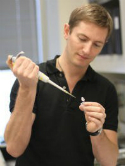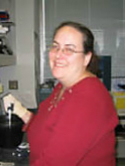Homeostatic control of recombination is implemented progressively in mouse meiosis Journal Article
| Authors: | Cole, F.; Kauppi, L.; Lange, J.; Roig, I.; Wang, R.; Keeney, S.; Jasin, M. |
| Article Title: | Homeostatic control of recombination is implemented progressively in mouse meiosis |
| Abstract: | Humans suffer from high rates of fetal aneuploidy, often arising from the absence of meiotic crossover recombination between homologous chromosomes. Meiotic recombination is initiated by double-strand breaks (DSBs) generated by the SPO11 transesterase. In yeast and worms, at least one buffering mechanism, crossover homeostasis, maintains crossover numbers despite variation in DSB numbers. We show here that mammals exhibit progressive homeostatic control of recombination. In wild-type mouse spermatocytes, focus numbers for early recombination proteins (RAD51, DMC1) were highly variable from cell to cell, whereas foci of the crossover marker MLH1 showed little variability. Furthermore, mice with greater or fewer copies of the Spo11 geneg-with correspondingly greater or fewer numbers of early recombination focig-exhibited relatively invariant crossover numbers. Homeostatic control is enforced during at least two stages, after the formation of early recombination intermediates and later while these intermediates mature towards crossovers. Thus, variability within the mammalian meiotic program is robustly managed by homeostatic mechanisms to control crossover formation, probably to suppress aneuploidy. Meiotic recombination exemplifies how order can be progressively implemented in a self-organizing system despite natural cell-to-cell disparities in the underlying biochemical processes. © 2012 Macmillan Publishers Limited. All rights reserved. |
| Keywords: | controlled study; unclassified drug; nonhuman; animal cell; mouse; meiosis; mammalia; animals; cell cycle proteins; mice; spermatocytes; gene; homologous recombination; mus; cell protein; genetic variability; nuclear proteins; mice, inbred strains; genetic recombination; regulatory mechanism; recombination, genetic; homeostasis; protein mlh1; rad51 protein; endodeoxyribonucleases; crossing over; rad51 recombinase; copy number variation; mitotic recombination; dmc1 protein; spo11 gene |
| Journal Title: | Nature Cell Biology |
| Volume: | 14 |
| Issue: | 4 |
| ISSN: | 1465-7392 |
| Publisher: | Nature Publishing Group |
| Date Published: | 2012-03-04 |
| Start Page: | 424 |
| End Page: | 430 |
| Language: | English |
| DOI: | 10.1038/ncb2451 |
| PROVIDER: | scopus |
| PMCID: | PMC3319518 |
| PUBMED: | 22388890 |
| DOI/URL: | |
| Notes: | --- - "Cited By (since 1996): 1" - "Export Date: 1 May 2012" - "CODEN: NCBIF" - "Source: Scopus" |
Altmetric
Citation Impact
BMJ Impact Analytics
Related MSK Work










